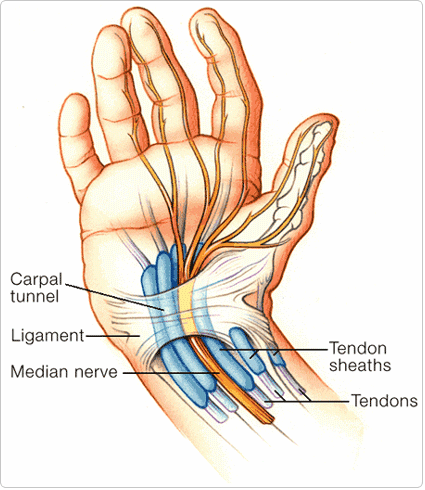Carpal tunnel syndrome (CTS) is a nerve entrapment syndrome caused by compression and irritation of the median nerve as it passes through a small anatomical “tunnel” within the wrist. The carpal tunnel is formed by the proximal row of carpal bones and as it does not yield, inflammation and swelling of the nerve results in compression.
The median nerve supplies sensation to the skin of the thumb, index, middle, and inside half of the ring finger. It also supplies the deep muscles of the hand and muscles of the thumb. Therefore, compression of the median nerve effects the function of the hand and thumb, and can cause a range of symptoms including:
- pain at the wrist, hand and forearm
- numbness and tingling in the thumb, index finger and ring finger
- thumb weakness, hand weakness
- symptoms are often worse at night

There are many factors that can increase the risk of developing carpal tunnel syndrome. Women are more likely to be effected than men, with the most common age group being 40-60.
Manual workers that are exposed to repetitive hand activities, vibrational forces and excessive hand pressure have a higher risk of developing CTS.
Research has shown that office workers that have excessively high use of keyboards has a cumulative effect across prolonged periods and can increase the risk of developing CTS.
Other conditions such as pregnancy and menopause that result in fluid retention can commonly cause CTS.
How Do we assess ?
Your physiotherapist will assess your wrist movements, grip strength and thumb strength. A sensation test will be completed to assess for the area of numbness. Special tests are used to confirm the diagnosis of CTS. Your neck, shoulder and thoracic spine may also be assessed as these areas can contribute to CTS. Median nerve flexibility will be assessed and is often found to reduced compared to the unaffected side.
Severe cases that cause thumb muscle weakness or wasting can require a diagnostic ultrasound or nerve conduction studies to provide further diagnostic information.
What Treatment is available ?
Conservative management such as physiotherapy should be the first line of treatment and has been shown to be effective in successfully reducing pain, improving grip strength and improving function in patients with CTS.
Splinting the wrist to ‘open’ the carpal tunnel can be very effective, especially at night when symptoms are worse, this offloads this irritated nerve and results in relief of pain and tingling.
Manual therapy is used to improve mobility in the wrist, cervical and thoracic spines. Techniques to promote improved median nerve flexibility is often used along with specific strengthening exercises.
Education and advice on positions to avoid along with load management are included in the rehabilitation process.
If symptoms are not settling other medical management includes corticosteroid injections and in severe cases decompressive surgery may be required.
All Physiotherapy staff at Physica are trained and experienced in providing assessment for hand and wrist injuries. Physiotherapy will assist with treatment of carpal tunnel syndrome, and identify when further medical management such as injections or surgery may be indicated.
